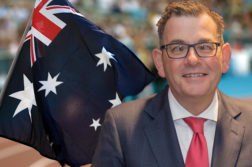In his book This Country, A Reconciled Republic, the historian Mark McKenna described the republic as "an 'inevitable' event which is discussed episodically in the media and arouses little interest in the electorate … like a shipwrecked explorer, it stands alone on the beach looking out to sea, waiting patiently for the government boat to come to the rescue".
Sure enough, this Australia Day season the republic debate returned to the news cycle: Wayne Swan penned an op-ed for the Fairfax press invoking the Bodyline series; Ausflag unveiled a new flag, to be flown at sporting events, that would show we're not "some British Branch Office, still clutching at the skirts of Mother England"; Nick Bryant opined in The Australian about our lack of vision and tendency to typecast; and last night the Australian Republican Movement held a youth forum, Our Australia 2033, at Victoria University. Yesterday at New Matilda, we published a piece by Cal Vimey arguing that the "resurgent" republican movement needs a renewed appreciation of the social contract if it is to prevail.
What's interesting about much of the new commentary on the republic is that it attempts to sidestep the deadlocks that have plagued the debate in the past. In this year's bevy of republican observations — and at the ARM's forum last night — traditional republican bugbears like the model (direct election or appointment) or Indigenous recognition were little discussed. Instead, the focus is on "identity", and whether Australia is currently experiencing an "identity crisis" that could be resolved by an Australian head of state.
The push to rebrand the republican debate as a personal question of identity, rather than a structural, political or constitutional problem, is at the heart of the ARM's new strategy and branding under its new leader, David Morris. Morris took the helm at the beginning of last year, and has brought his experience as a diplomat and in international business (with an Asian focus) to the job.
I spoke with Morris last year, not long after the ARM had returned from a Tasmanian trip conducting surveys and focus groups. "People throughout the political process are republicans but they [the political leadership]are not actually putting it on the agenda," he said. "In a way I'm not blaming them — they need to see the community cares."
Morris believes the debate has been cruelled by complacency on the part of the mainstream media, who portray the debate as a "conflict story" between republicans and monarchists, when in his estimation, the issue is one of national maturity — "like a child leaving the home".
The ARM's plan to combat this perception is simple: they are collating hundreds of responses to a survey on Australian values and identity, the results of which will be packaged up. Morris will then "come back to the mainstream media and say: 'here's how Australians think about this issue and you guys have got it all wrong'".
On their Tasmanian leg, they had a powerful ally. David Walsh, the wealthy founder of the Museum of Old and New Art, donated the venue for the ARM's fundraiser and spoke at the campaign's media launch.
In the same way that Ausflag is trying to rebrand, arguing that "placing the symbol of a major sporting and commercial competitor in the dominant position of our flag is as ludicrous as Google placing an Apple logo in a dominant position in their advertising", Morris admits that the ARM's new push is "…entirely a rebranding exercise. That's entirely what it would be".
For instance, the ARM's focus groups found that young people have a "celebrity attachment" to the royals, but by and large "no-one had any particular emotional connection, or thought they should have a constitutional role". Consequently, the ARM is taking great pains to avoid appearing hostile. "[We] don't see them as essential — they're friends of ours because Britain's a friend," Morris said.
The ARM has also fully adopted the marketing-speak of the "Asian century", insisting that a republic is necessary for us to take our place in the new order.
"Especially in Asia there's still in the senior levels of business and government a suspicion that Australians aren't quite comfortable with Asians, that Australia isn't comfortable in Asia, that we want to cling to some kind of past," Morris said.
"We should be aware that the white Australia period isn't a period we can be proud of — we were a pariah in the neighbourhood — and we don't realise that in modern Australia … Australians offshore are acutely aware of the fact that we have an image problem. Australians in Australia don't feel it. It's not a live or die issue; it's just a mismatch, our image is out of date."
The participants in last night's forum completely embrace this new attitude, and for the most part come from a space that combines policy, PR and lobbying: Sarah Saleh from the Australian Youth Forum; Amelia Kemister from online lobbying outfit Our Say; and Tim Wilson, from the free market think tank the Institute of Public Affairs, were notable inclusions.
Even Wilson, a self-described "classical liberal" from a libertarian think-tank, bought into the identity rhetoric, and spent much of the evening baiting the other (left-wing) participants over Australia's roots in "the Western liberal tradition" and whether we are truly multi-cultural or merely multi-racial.
It's hard to say whether the ARM's reframing of the debate can succeed, but it is already having an effect on how the republic is conceived. One wonders what effect an Australian head of state would have on issues like public education, Indigenous health and reducing carbon emissions; certainly the panelists who identified those as priorities for a future republic gave little indication.
Listening to the discussion last night, the virtues of tolerance, multiculturalism and the like took centre-stage — worthwhile for sure, but essentially a vision of a republic where nobody is excluded and nobody loses. Could such a model defeat the resentment that surrounded the failed referendum of 1999, or bridge the divide between city and country? As the poet Les Murray said in a 1996 senate lecture on the republic:
"…scorn did seep through and damage self‑esteem in the bush, causing a measure of rancour and distrust of official virtues such as equality. Would equality with us be much of a compliment? But also, would equality with soft‑handed suit wearers be a compliment to any of us?"
By reframing the republic debate as an issue of personal identity, and using the language and tools of advertising, the ARM, Ausflag and the like are attempting to avoid conflict altogether — with both the royals and local critics. By trying hard to please everybody, the new republican movement may end up pleasing nobody.
Donate To New Matilda
New Matilda is a small, independent media outlet. We survive through reader contributions, and never losing a lawsuit. If you got something from this article, giving something back helps us to continue speaking truth to power. Every little bit counts.



